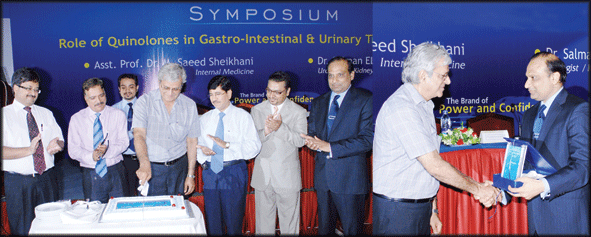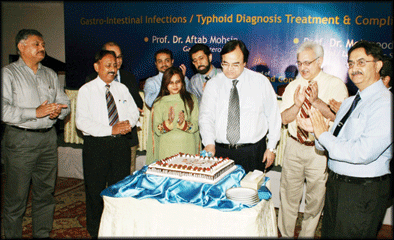|
KARACHI: To
celebrate twenty years of introduction of Ciprofloxacin, Bayer
HealthCare organized a seminar in Karachi on May 29th. It was chaired by
Prof. Mashoor Alam Shah Head of the Dept. of Medicine at Liaquat
National Hospital while the speakers were Dr. Saeed Sheikhani from
Hamdard University Medical College and Dr.Salman El-Khalid from Kidney
Center, Karachi. Dr. Abdul Majid Rana from Kidney Center was also a
member of the expert’s panel. The meeting was very well attended by
members of the medical profession.
In his presentation on diagnosis and management of Typhoid Fever (TF)
Dr. Saeed Sheikhani first talked about the host factors and mentioned
age, personal hygiene, gastric acidity, intestinal motility, enteric
flora, specific immunity and intestinal receptors. Speaking about
bacterial infections he mentioned enteritis, dysentery and symptoms
might appear eight to twenty four hours after food ingestion. In case of
bacterial shigellosis the symptoms take two to seven days and in some
cases it is a self limiting disease. The patients present with fever,
abdominal pain and bloody diarrhea. Bacteremia may be seen in 4% of
cases. He then talked about E. coli gastroenteritis and Escherichia coli
besides other organisms involving GI infections.

Prof. Mashoor Alam Shah along with
guest speakers and senior executives of Bayer HealthCare cutting the
cake to mark the 20th Year of marketing of
Ciprofloxacin at a seminar held in Karachi recently. On right Mr.
Nayer Islam Marketing Manager of Bayer Haelthcare presenting shield to
Prof. Mashoor Alam Shah during the seminar.
Typhoid Fever, Dr. Saeed Sheikhani said is a systemic infection and it
accounts for about six hundred thousand deaths annually in the world.
Those who suffer are those who have either close contact with the
patient or have a relative with typhoid fever. He then discussed the
pathogenesis of typhoid fever and immune response in typhoid. Onset of
TF, he said is gradual, duration is short and the patient complains of
high grade fever, chill, rigors, associated with GI symptoms. He was of
the view that in case of fever without any cause for a week, one may
consider it treating as typhoid fever.
Most of the patients are children and young adults and most of them are
treated as Out Patient cases. Incubation period is usually between seven
to fourteen days. They also complain of anorexia, nausea, dry cough,
muscle pain, tender abdomen, coated tongue, hepatomegaly and
splenomegaly are all common. Rose spots can also be seen on the upper
parts of the abdomen. Some of the cases may relapse in third or fourth
week. For diagnosis, blood culture is the standard diagnostic tool. Bone
Marrow culture is very sensitive. BM is usually positive in over 80% of
cases. Widal test has now become a bit controversial because of other
facilities becoming available. Typhidot test has a 70-80% sensitivity
and 80-85% specificity. About 10-15% of patients can have complications
which include GI bleeding and intestinal perforation in 1-3% of cases.
Relapse does take place in 5-10% of cases while re-infection may also
occur. About 1-4% of patients of typhoid fever also become carriers.
Carrier state is more common in females and 25% of carriers have no
history of typhoid fever.

Prof. Zafrullah Khan
Vice Chancellor King Edward Medical University cutting the cake at the
Bayer HealthCare seminar held at Lahore to mark the 20th year of marketing of
Ciprofloxacin.
Among the differential diagnosis Dr. Saeed Sheikhani mentioned malaria,
deep abscess, and abdominal tuberculosis. Speaking about the
antimicrobial treatment he mentioned the qualities of an ideal
antimicrobial agent which is delivered to the site of infection. Usually
quinolones are the good choice. He also referred to the success story of
ciprofloxacin and said that treatment with this agent is effective in
all age groups. It is the most potent quinolones with very broad
spectrum activity. It has good bioavailability, is effective against
most organisms with proven efficacy. It is available in oral as well as
IV form. However, preventive measures are essential which include supply
of pure drinking water, good sewerage system besides good cooked food.
He concluded his presentation by stating that Fluroquinolones are the
drugs of choice for treatment of Typhoid Fever but it must be used in
full dose for adequate time.
Diagnosis and Management of UTI
Dr. Salman El-Khalid
consultant urologist from Kidney Center talked about diagnosis and
treatment of Urinary Tract Infections. He pointed out that any bacteria
can cause infection and about twelve million cases were reported last
year. It included 10% infections. About 20% of women experience UTI in
their life time and one third will report recurrence following year. He
stressed the fact that UTI should not become a recurrent disease.
Speaking about the risk factors he mentioned obstruction to urine flow,
pre pubertal girls, sexually active young women, elderly male and
female, pregnancy, immune deficiency, genetic factors which all
predispose to urinary tract infections. He also talked bout the
predisposing factors in the elderly in detail. These UTIs, he said, can
be classified as primary and recurrent, complicated and uncomplicated
ones. Uncomplicated UTI can present as acute cystitis in healthy
patients. The complicated UTI can be infection associated with a
condition that increases the risk of acquiring infection of failure of
therapy.
Potential factors in complicated UTIs include male, elderly, Hospital
Acquired infections, pregnancy, indwelling urinary catheter, recent UTI
intervention, and diabetes mellitus. Stones can be a cause of
obstruction. Almost 80% of infections are E. coli. Before starting
treatment on empirical basis, one must find out the common organism in
the community or area. Symptoms include flank pain. Diagnosis is not
based on urine DR. Radiological examination may be necessary in most
patient with UTI whose fever does not resolve after five days of
adequate antibiotic therapy. As regards UTI in males, pus cells will
remain as long as catheter is there. Culture is the diagnostic criteria.
In case of increase in creatinine, increase the dose. Young girls soon
after marriage may complain of honeymoon cystitis. In such cases there
is no need for any expensive investigations, just treat them with
antibiotics, he remarked.
Continuing Dr. Salman El-Khalid said that urinary tract is supposed to
be sterile and there should be no bacteria. Asymptomatic bacteriurea is
a state where bacteria are present but there are no symptoms. Recent UTI
attacks account for 10%. Twenty percent of UTI patients are relapse
while 80% consist of re-infection. He emphasized the importance of using
right antibiotic, in right dosage and for right duration. Diabetes in
elderly does affect their defense mechanism. His advise was high fluid
intake, no catheterization until essential, double urination in case of
recurrence, keep the pads away from urethra and take last dose of
medication after urination before going to bed. In case of obstruction,
it must be removed. Health education of the patients, treatment of the
underlying factors is essential besides frequent and complete voiding.
Among the antimicrobial agents used for treatment of UTI are co-trimoxazole,
Penicillin, cephalosporins but quinolones are considered the best. His
conclusions were that UTI is very common. It increases with age and
before treatment differentiation between complicated and uncomplicated
UTI is very important.
Dr.Tajamal Husain Medical Advisor in Bayer HealthCare also spoke on this
occasion and said that it was twenty years ago when ciproxin was
effectively marketed. Bayer has fifty years experience dealing with
infections. Preventive measures, he said, are also important to minimize
the chances of infections. Bayer commissioned its first drug
manufacturing plant in Germany in 1863. It has a well staffed Research
and Development department busy in discovery of antibiotics and Bayer
has a history of anti-infective successes. Ciproxin is now available in
more than hundred countries. Apart from Cipro, we have marketed Avelox (moxifloxacin)
which is a gold standard for many gram negative infections. Resistance
to antibiotics varies within the hospitals, region and countries. Local
resistance pathogens should be taken into account before using empirical
antibiotic therapy. This agent is a drug of choice for treating RTI, UTI,
severe infections. We have also introduced a new delivery device for
severe COPD.
In his concluding remarks Prof. Mashoor Alam Shah said that Bayer has
been marketing useful effective drugs for a long time. It makes
available quality drugs which give satisfying results. Speaking about GI
infections, he laid emphasis on good hygiene which is very important in
poor countries. He was of the view that before starting treatment, we
must get stool, urine culture done to ensure correct treatment. Onset of
fever in children, he said, may be sudden and ciprofloxacin is a
wonderful drug. As regards acute urinary tract infections, it must be
eliminated once for all, he added. Later Mr. Nayyer-ul-Islam Marketing
Manger Bayer HealthCare thanked the guest speakers and the participants. |
